If Robert Eggers’ Nosferatu bewitched you with its gothic horror, atmospheric tension, and bone-deep unease, you’re likely seeking more films that deliver a similarly haunting experience. A mesmerizing reimagining of F.W. Murnau’s 1922 horror landmark, Nosferatu (2024) resurrects Count Orlok with Eggers’ signature cinematic dread and immersive storytelling. It’s a homage to classic German Expressionism, where every frame speaks as vividly as the script. Here are 19 films that share the thematic, visual, and stylistic essence of Nosferatu.
1) Nosferatu (1922)

Long before Dracula donned his cape and charmed his victims, there was Nosferatu, a spectral nightmare of silent cinema, steeped in German Expressionism and etched into horror history. F.W. Murnau’s illicit and unofficial take on Bram Stoker’s Dracula reshaped the vampire legend into a chilling, nightmarish vision that remains deeply unsettling to this day. With his emaciated frame, hollow eyes, rodent features, and eerily long fingers, Max Schreck’s Count Orlok is the embodiment of pure dread. It is a masterclass in vintage horror.
2) Nosferatu the Vampyre (1979)

If Robert Eggers’ Nosferatu sent shivers down your spine, just wait until you experience Werner Herzog’s take. This 1979 reimagining of the silent horror masterpiece is hauntingly lyrical, hypnotic, and unsettling. As Count Dracula, Klaus Kinski delivers a performance that is both monstrous and tragic, embodying a creature condemned to eternal suffering. In contrast to the grotesque, rat-like Orlok of the original, Kinski’s vampire exudes melancholy, burdened by a fate he never chose.
3) The Innocents (1961)
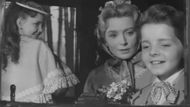
If haunting, slow-paced gothic horror captivates you, don’t miss The Innocents (1961). A chilling take on Henry James’ The Turn of the Screw, this adaptation drips with eerie tension and ghostly whispers. Miss Giddens, played by Deborah Kerr, arrives at a grand but eerily empty estate to care for two seemingly innocent children. But something is off. The children behave strangely, and reality itself shifts. If Nosferatu’s haunting play of light and darkness enthralled you, The Innocents will leave a lasting impression on your mind.
4) Interview with the Vampire (1994)

Adapted from Anne Rice’s novel, Interview with the Vampire (1994) is no ordinary vampire tale. It is a mesmerizing and melancholic exploration of immortality, solitude, and what it truly means to live (or not). With its star-studded cast, the movie brims with gothic romance, each frame unfolding like a living masterpiece. Fans of Nosferatu's haunting, atmospheric dread will find Interview with the Vampire just as brooding, but with a heightened sense of drama and emotion.
5) Dracula (1931)
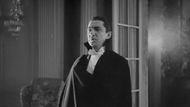
Dracula (1931), directed by Tod Browning and starring Bela Lugosi, is a horror classic for a reason. It laid the groundwork for all subsequent vampire movies that emerged. From his smooth, captivating gaze to those menacing fangs and unforgettable accent, it’s a classic. There’s a distinct magic to Dracula. Its pacing, simmering tension, and masterful buildup of the Count’s legend make it essential viewing for lovers of classic horror.
6) Dracula’s Daughter (1936)
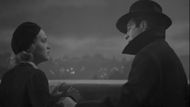
This underrated follow-up to Dracula (1931) takes a more shadowy and introspective route with gothic elegance and psychological intrigue. Dracula’s Daughter (1936) dives into much darker waters, especially with the character of Countess Marya Zaleska, played by Gloria Holden. The film carries a moody, atmospheric vibe and feels slightly ahead of its time. As one of the earliest horror movies to subtly explore themes of repression and sexuality, it adds a layer of depth that distinguishes it from typical vampire stories.
7) The Hunger (1983)
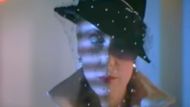
Not all vampires sulk in shadows, some own them. The Hunger (1983) is a tale of immortality, love, and desire, starring Catherine Deneuve, David Bowie, and Susan Sarandon. Under Tony Scott’s direction, it becomes a visual masterpiece, drenched in moody tones, seductive lighting, and an eerily gorgeous score, especially Bela Lugosi’s Dead by Bauhaus. If Nosferatu’s gothic mystique mesmerizes you, The Hunger will surely leave its mark.
8) Shadow of the Vampire (2000)
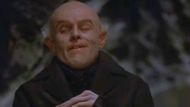
A chilling blend of dark comedy and horror, Shadow of the Vampire (2000) offers a twisted reinterpretation of the filming of F.W. Murnau’s 1922 OG masterpiece. Willem Dafoe fully immerses himself in the role of Schreck, delivering a performance so unsettling and hypnotic that you can’t tear your eyes away. Meanwhile, Malkovich brings Murnau to life as a maniacal genius, obsessed with achieving cinematic perfection at any cost. If Eggers' haunting, meticulous take on horror catches your attention, this one might captivate you even more.
9) Possession (1981)

If you're in search of films that get under your skin and make you question everything, Possession (1981) promises an unforgettable cinematic ride. Directed by Andrzej Żuławski, this psychological horror-thriller blends haunting, surreal visuals with intense, emotionally charged performances. The film follows the disintegrating life of Anna, portrayed by Isabelle Adjani, who finds herself trapped in a failing marriage. The story grows increasingly bizarre as she embarks on an affair with an enigmatic, monstrous figure. This is not a film for the faint-hearted.
10) The Third Part of the Night (1971)

Directed by Andrzej Żuławski, The Third Part of the Night (1971) is a Polish film that blends surrealism, psychological horror, and historical trauma. Set against the turmoil of World War II, it follows Michal, a man ensnared in brutality, forced to confront both the savagery around him and the demons within. The film’s striking contrast between haunting surrealism and raw realism creates a deeply disorienting and unsettling experience.
11) Let the Right One In (2008)
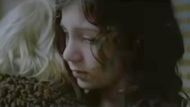
Let the Right One In (2008) intertwines eerie horror with melancholic beauty, crafting a remarkable coming-of-age story. In the icy outskirts of Stockholm, 12-year-old Oskar endures relentless bullying, nursing silent fantasies of vengeance. Then comes Eli, a vampire disguised as a peculiar girl who emerges only after dark, carrying an unsettling scent. As Eli’s thirst for blood clashes with Oskar’s deepening affection, their friendship becomes a delicate mix of innocence and horror.
12) Fright Night (1985)
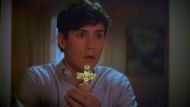
If you’re in the mood for a vampire movie that’s eerie, effortlessly cool, and a total blast, Fright Night (1985) is the perfect pick. What starts as a mundane high school life for Charley Brewster takes a sinister turn when he discovers that his charismatic new neighbor, Jerry Dandrige, is actually a bloodthirsty vampire. What sets Fright Night apart is its perfect fusion of horror and humor. Chris Sarandon’s Jerry is as terrifying as he is captivating. It’s eerie, it’s side-splitting, and it nails that campy-creepy vibe that defines ‘80s horror.
13) IT (2017)
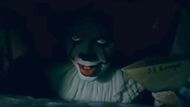
If you have the faintest fear of clowns, IT (2017) might have given you sleepless nights. Based on Stephen King's iconic 1986 horror tale, IT transports us to the haunted town of Derry, where kids are vanishing and an ancient evil hides beneath the sewers, shape-shifting into your worst fears. But the most iconic form it takes? Pennywise the Dancing Clown, a menacing, balloon-clutching entity played by Bill Skarsgard. Striking a balance between coming-of-age nostalgia and gripping nerve-racking terror, this film is one of the most successful modern horror adaptations.
14) The Lighthouse (2019)

The Lighthouse (2019) is one of those films that twist your mind in the most unforgettable way. Directed by Robert Eggers, it transports you to a remote 19th-century lighthouse where two keepers, played by Robert Pattinson and Willem Dafoe, spiral into madness while stranded together. It’s dim, it’s intense, and it’s not just the eerie, ominous atmosphere, but also the gradual unraveling of the mind that takes center stage in this black-and-white film.
15) The Shining (1980)
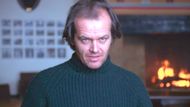
For those who reveled in the eerie atmosphere, slow-burning tension, and mind-bending fear of Robert Eggers' Nosferatu, The Shining (1980) is an essential watch. Directed by the visionary Stanley Kubrick, this film immerses the audience in the psychological abyss of isolation. Jack Nicholson's iconic portrayal of Jack Torrance drives the slow burn of his character’s madness, gradually consumed by the sinister force within the hotel. This is more than a ghost story; it’s a chilling journey into the depths of insanity.
16) Hereditary (2018)
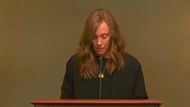
Directed by Ari Aster, Hereditary (2018) hits you with a gut-wrenching psychological horror, much like Nosferatu, sidestepping conventional jump scares and tropes. The film delves into themes of family, grief, and hidden truths, but its unpredictable narrative keeps you constantly questioning what’s grounded in reality and what leans into the supernatural. For fans of Nosferatu's psychological torment and haunting, Hereditary presents an equally disturbing tale, but with a more contemporary, bone-chilling edge.
17) The Wailing (2016)

This South Korean horror film, helmed by Na Hong-jin, delves into sinister, enigmatic forces, delivering a bone-chilling, supernatural atmosphere that hits just as hard as Eggers’ gripping version of the vampire myth. In a distant village plagued by inexplicable deaths and violent outbursts, The Wailing (2016) spins a compelling story of ancient folklore, possession, and the terrifying unknown. The ominous tone is set from the start with extended, atmospheric shots, minimal conversation, and a steady crescendo of horror.
18) The Witch (2015)
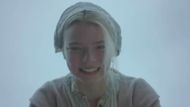
Robert Eggers' 2015 film The Witch is a slow-burn, period horror masterpiece that pulls you into the dark and desolate world of 17th-century New England. This tale revolves around a Puritan family, their fragile peace shattered by personal turmoil, who spiral into madness as they become convinced that a witch resides in the nearby forest. The story exudes a suffocating sense of dread and foreboding, reminiscent of the eerie tension in Eggers' Nosferatu.
19) Thirst (2009)
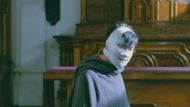
If the eerie beauty of Eggers’ Nosferatu left you craving more masterfully shot, unsettling vampire sagas, Park Chan-wook’s Thirst (2009) belongs on your watchlist. Part horror, part tragic, this South Korean vampire drama is anything but conventional; it's ruthless, mesmerizing, and twisted enough to leave you questioning everything. Sang-Hyun, a devout priest, volunteers for an experiment that goes wrong, leading to a feverish, doomed affair with his best friend’s wife. Like Eggers’ films, Thirst builds unease through slow-burning tension, a rich atmosphere, and the horrors of human nature.
Your perspective matters!
Start the conversation
